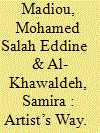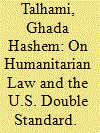|
|
|
Sort Order |
|
|
|
Items / Page
|
|
|
|
|
|
|
| Srl | Item |
| 1 |
ID:
186518


|
|
|
|
|
| Summary/Abstract |
While critics take a particular interest in discussing Mohsin Hamid as a novelist of globalization, migration, war, politics, economics, and capitalism, I contend that Hamid manifests a strong interest in, even obsession with, art in his fiction and non-fiction, which also makes him a novelist of art. Relying on his own words in his non-fiction, I argue that Hamid expresses a direct, often indirect concern about his artistic life, which includes his artistic experiences, ways, pursuits, and struggles in the globalized world of art. This article aims to ground my obstinate claim that Hamid symbolically exposes his own artistic life in his fiction in reality; it does this by focusing on Hamid’s non-fiction where his personal confessions can be said to be the most pronounced in contrast to his fiction where these are symbolic and, therefore, less definite. It establishes the basis on which my subsequent claim that Hamid speaks about his artistic experiences in his fiction can stand and, by extension, the claim that his fiction, besides being metafictional, can also be considered autobiographical.
|
|
|
|
|
|
|
|
|
|
|
|
|
|
|
|
| 2 |
ID:
186520


|
|
|
| 3 |
ID:
186519


|
|
|
|
|
| Summary/Abstract |
U.S. criticism of its client/ally Saudi Arabia regarding the killing of journalist Jamal Khashoggi immediately diminished the kingdom’s ability to secure funds for its latest mega development project, the Neom convention center. U.S. intelligence pinned the crime on aides to Crown Prince Muhammad Bin Salman (MBS). At the same time, a seemingly unauthorized operation, later attributed to former president Donald Trump, killed a top Iranian commander, Qasem Suleimani, by a drone strike. Congress was not involved and the UN protested this as a violation of Article 51 of its Charter, emphasizing that this was justified in a case of imminent threat, undertaken only by a state. Encouraged by drone technology, the U.S. found it easy to locate the target and minimize collateral damage. International lawyers and military experts are still debating the legitimacy of such action. The U.S. is persisting in claiming that it upholds the standards of international humanitarian law which sometimes sanctions targeted killing. A number of international law professors continue to deride U.S. action as illegal, while the latter continues to describe its actions as defensive in nature. Organizations such as Human Rights Watch lament the reluctance of previous U.S. presidents to define targeted killing.
|
|
|
|
|
|
|
|
|
|
|
|
|
|
|
|
|
|
|
|
|